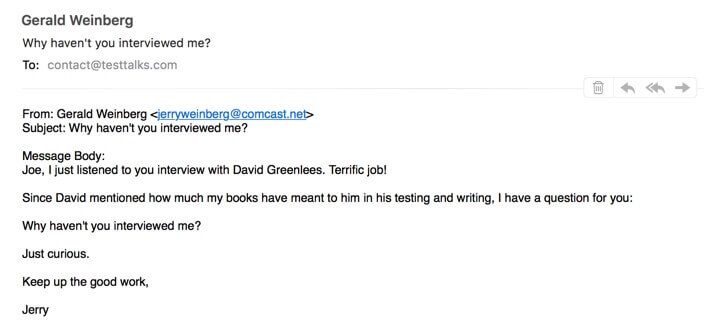I was saddened to hear that Gerald Weinberg, one of the leaders in our industry, passed away this week.
Gerald Weinberg had been developing and testing software for over 50 years and was one of the engineers who worked on the first American NASA space program (Project Mercury), where he designed and implemented the space tracking network focusing on the first multi-programmed operating systems.
Jerry was also a prolific author of 30+ books.
It was an honor to have had the opportunity to interview Jerry on my podcast way back in Episode 100 of Test Talks in 2016. What was funny was that Jerry contacted me, asking why I hadn’t yet asked him for an interview. I told him that I had thought he was out of my league!

The bright spot is that Gerald left a legacy of knowledge for us in his writing as well as his generous sharing of his wisdom. You can see his passion for testing being carried on in folks like Michael Bolton and others.
Following are some of my favorite nuggets of wisdom from my interview with Jerry.
The secret to being a productive tester or writer
I don't know if there's one secret. Maybe the secret is, sort of on the Meta level, is to stop looking for secrets and just figure out one little improvement at a time.
Get rid of things that are using your time that are not productive and that you don't like to do.
Part of it is you have to love what you're doing and if you don't love it, then it's pretty hard to bring yourself back to it. Writing, for instance, and writing code and so on is easy to postpone so you really learn to love it. When people tell me, “Oh, I hate writing and it's very hard for me.” I'm like well, then maybe you're just not cut out to be a writer.
You find a way to love it.
Same way with testing, find a way to love it and then you'll find, instead of excuses not to do it, you'll find excuses to do it.
On software development and testing estimates
I can predict anything except the future and that's the problem.
To some extent, we can predict the future quite a lot so that we get in the illusion that we can predict it all the time and we can predict it very precisely. You can predict it and you can plan, just be ready if your plan isn't working out, then you make a revision of the plan as you plan to re-plan.
Testing is harder than Development
Testing is harder than developing. If you want to have good testing you need to put your best people in testing. Your smartest people and maybe a little different type of person, someone as we said who listens better, talks better, so it's a very exceptional kind of person that makes a great tester.
If you believe in that kind of thing then you should reward them better than you reward the developers. Instead, I go around and I find that people habitually pay their testers less than they pay their developers. That's the number one thing that is not understood.
[tweet_box design=”default”]Testing is harder than developing. If you want to have good testing you need to put your best people in testing.~Gerald Weinberg[/tweet_box]
On automation replacing testers
Automation is another example of what the anthropologists call “magic.”
Abraham Lincoln had this riddle: he said, “If you call a tail a leg, how many legs does a dog have?” What's the answer to that? Well, some people would say five and Lincoln would say, “No. Calling it a leg doesn't make it a leg,” so calling it automation doesn't make it tester automation. It's just a label, it sells well and so on.
To do successful test automation there's so much other stuff surrounding it. You may have tools that automate certain tests but it doesn't automate testing.
Listen to the full interview with Jerry here and soak up the knowledge Jerry left behind. What a legacy of awesomeness.






Sad to hear legend passed away :( RIP!!!